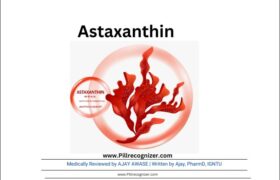Astaxanthin: The Powerful Antioxidant
Astaxanthin is a carotenoid pigment found in nature, primarily in algae and seafood like salmon and shrimp. Known for its vibrant red-orange color, astaxanthin is also a potent antioxidant that offers various health benefits.

Red pigment astaxanthin is a member of the class of substances known as carotenoids. It gives salmon its pink-red hue and is found in some types of algae.
Astaxanthin is used by people for a variety of conditions, including as Alzheimer’s disease, sports performance, aging skin, aching muscles from exercise, and many more. However, these applications are not well supported by scientific data.
Benefits of Astaxanthin
- Strong Antioxidant: Astaxanthin is considered one of the most powerful antioxidants found in nature. It helps neutralize harmful free radicals, which can contribute to chronic diseases like heart disease, cancer, and premature aging.
- Eye Health: Astaxanthin has been shown to support eye health. It may help protect against age-related macular degeneration (AMD) and improve overall eye function.
- Brain Health: Studies suggest that astaxanthin may enhance cognitive function and protect the brain from oxidative stress, which can contribute to neurodegenerative diseases like Alzheimer’s and Parkinson’s.
- Muscle Health: Athletes and individuals seeking to improve muscle performance may benefit from astaxanthin. It has been shown to reduce muscle damage and improve recovery time after exercise.
- Skin Health: Astaxanthin may help protect the skin from sun damage and premature aging. It can help reduce wrinkles, fine lines, and improve overall skin elasticity.
Safety and Side Effects
Astaxanthin is generally considered safe when consumed in recommended doses. However, individual tolerance may vary. Some common side effects may include gastrointestinal issues like upset stomach or diarrhea.
It’s essential to consult with a healthcare professional before taking astaxanthin supplements, especially if you have any underlying health conditions or are taking medications.
Special Precautions and Warnings:
When consumed orally: Astaxanthin is a substance that can be found in a variety of foods and is typically ingested in moderation. Taking astaxanthin as a supplement may not be harmful. 4–18 mg of dosage per day has been utilized for a maximum of 12 weeks. Reddish-colored stools and an increase in bowel motions may result with astaxanthin consumption. Astaxanthin overdosage may result in gastrointestinal ache.
Breastfeeding and pregnancy: It is not possible to determine whether astaxanthin is safe to take during these times due to a lack of trustworthy information. Be cautious and refrain from utilizing more than what is present in food.
Moderate Interaction
Drugs that are altered by the liver (substrates of cytochrome P450 2B6; CYP2B6) interact with ASTAXANTHIN
The liver modifies and breaks down several drugs. Astaxanthin may alter the rate at which the liver metabolizes various drugs. This may alter these drugs’ effects and adverse reactions.
Drugs that are altered by the liver (substrates of cytochrome P450 3A4) interact with ASTAXANTHIN
The liver modifies and breaks down several drugs. Astaxanthin may alter the rate at which the liver metabolizes various drugs. This may alter these drugs’ effects and adverse reactions.
Dosing
Adults have most frequently taken 4–18 mg of astaxanthin orally once a day for up to 12 weeks. To find out what dosage could be appropriate for a particular disease, consult a healthcare professional.
How to Incorporate Astaxanthin into Your Diet
- Seafood: Salmon, shrimp, and other seafood naturally contain astaxanthin.
- Supplements: Astaxanthin supplements are available in various forms, including capsules, softgels, and powders.
- Algae: Some types of algae, like Haematococcus pluvialis, are rich in astaxanthin.
FAQ:
What is astaxanthin good for ?
Astaxanthin is taken by mouth for treating Alzheimer’s disease, Parkinson’s disease, stroke, high cholesterol, age-related macular degeneration (age-related vision loss), and preventing cancer.
Who cannot take astaxanthin ?
Individuals who suffer from bleeding disorders, autoimmune diseases, diabetes, hypertension, low blood calcium, allergies, asthma, and other conditions should be particularly aware about astaxanthin.
Does astaxanthin brighten skin ?
Additionally, astaxanthin helps lighten dark areas. It helps the skin defend itself against sun damage by providing strong protection against UV rays. To put it simply, it prevents too much melanin, which lightens age spots.
Does astaxanthin increase testosterone?
Astaxanthin may also lower blood pressure and calcium levels. One tiny study found that astaxanthin plus saw palmetto actually raised testosterone, which may aid libido. More research is needed to fully understand astaxanthin’s effects on hormones.
Is astaxanthin a DHT blocker?
In theory, suppressing the activity of 5-alpha reductase enzymes can lead to a reduction in DHT levels.


Leave a Reply